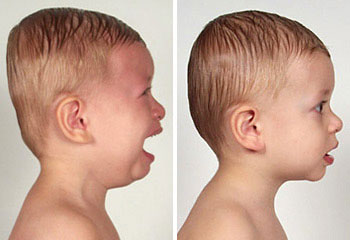Anewbornbabyspendshistimesleepingthroughoutthedayandnight.Findoutaboutthesleepcycleandsleeppatternsofanewborn.Anewbornbabydoesnotdomuchapartfromsleepingthroughoutthedayandnight,inmostcases.Onanaverage,theywakeupforfeedingseveryfewhours.Newparentsthus,oftenfallintoadilemmaonwhethertheirnewbornisgettingenoughsleeporissleepingtoomuch.Theyalsogetconfusedabouttheirsleeppatternastheydonotseemtomaintainaroutineone.Veryoften,thescheduleturnsoutsuchthatthenewbornsleepsthroughoutthedayandwakesuptostayawakefortheentirenight!InthisarticleWhatOughttoBetheSleepPatternofaNewborn?WhatMakestheBabyWakeUpEveryNowandThen?TheSleepingStatesofaNewbornTheSleepPatternWhatOughttoBetheSleepPatternofaNewborn?Usuallyanewbornisexpectedtosleepforeighttoninehoursduringthedayandapproximatelyeighthoursduringthenight.Mostnewbornsdonotactuallysleepforsixtoeighthoursatastretchthroughoutthenight.Theywakeupforanumberoftimesinbetweenandthisroutinecontinuestillthenewbornisusuallythreemonthsold.Thishabitalsostopswhenthebabyattainstheweightof12-13pounds.WhatMakestheBabyWakeUpEveryNowandThen?Newbornshaveatinystomachandtheycantaketheirfoodonlyinsmallquantities.Thisiswhytheywakeupeverythreetofourhourstofilltheirstomach.Parentsneedtotakenotethatunlessyourpaediatricianadvisesotherwise;itisnotrequiredofyoutowakeupyourlittleoneinthemiddleofhissleep.However,thisisalsoimportantthatyoushouldnotletthebabystayasleepforoverfivehoursatastretchfortheinitialfivetosixweeks.Insomecasesifthebabyhappenstobebornprematureitisnecessarytowakehimupforafrequentfeedingeverycoupleofhours.Inanycase,itisalwaysadvisabletoconsultandactaccordingtothedirectivesgivenbythepaediatrician.TheSleepingStatesofaNewbornJustlikeadultsthestageanddepthofsleepvariesinthenewbornstoo.Youmayfindthebabymovingactivelyorlyingquitestilldependingonwhichstageheisinatthemoment.Basically,duringthefinaltrimesterofthepregnancy,thesleepingpatterngetsdevisedinthebaby.Thestagesare:REMortheRapidEyeMovementSleep–Inthisstagetheeyemovementsarefoundtoberapidandthereisaswiftbackandforthmovement.Thisisthelightsleepanddreamstage.Onanaverage,newbornbabiesregularlyspendsixteenhoursforsleeping.50%nofthisdurationisREMsleep.Astheygrowolder,theamountofthisREMsleepdecreasesgradually.Non-REMSleep–Thisstageisfurtherdividedintofourseparatecategories:Stage1–Thisiscategorisedbymildtoextremedrowsiness.Youwillfindthatthebabyiscontinuouslyopeningandclosinghiseyes,hiseyelidsdroopandhebeginstodozeoffeverynowandthen.Stage2–Thisisthestageoflightsleep.Hisactionsbecomeslower,hedoesnotmovearoundtoomuchandstaysquietforawhileandwillgetstartledifthereisasound.Stage3–Thisisthedeepsleepstagewherethebaby’smovementbecomeslittletonomovement.Hebecomesquiet.Stage4–Thisistheverydeepsleepstage.Thereissimplynomovementandthebabysleepsinpeace.TheSleepPatternThesleepcyclecommenceswithstage1andthenitgraduallyadvancestostage2,3and4,andthentracebackto4,3,2andfinallytotheREMstage.Thecyclecangetrepeatedduringasinglesessionofsleep.Intheinitialstageorthefirstfewmonths,parentswillnotethatthebabieswakeupcompletelyastheymaketheirtransitionfromdeeptolightsleepandthenpassontocontinuewiththecycle.Itisalsonoticedthatsomebabiesfinditdifficulttoresumethecycleoncetheywakeup.Thisisofcourseuntiltheyareabletoformaregularsleeppattern.Finally,thepointstonoteregardingthesleeppatternofyournewbornaretolookoutforsignsandbeveryobservant.Ifyoufindthatthebabyhasanundisturbedandconsistentsleepandwakeupallofasudden,thereisapossibilityofearinfection.Reportthisbehaviourtothepaediatricianandgetthebabyexaminedwell.Itcanalsobethatthebaby’ssystemissimplyover-stimulatedandthisisthesolereasonforhissuddenawakening.Thiscanbeasimplemarkofhisgrowingupprocess.Anotherpointthatyoumusttakecareofisthat,putyourbabytosleepwithhisfeedingbottlestucktohismouth.Thisisdangerousandcanleadtochokingandearinfections.
A newborn baby spends his time sleeping throughout the day and night. Find out about the sleep cycle and sleep patterns of a newborn.A newborn baby does not do much apart from sleeping throughout the day and night, in most cases. On an average, they wake up for feedings every few hours. New parents thus, often fall into a dilemma on whether their newborn is getting enough sleep or is sleeping too much. They also get confused about their
sleep pattern as they do not seem to maintain a routine one. Very often, the schedule turns out such that the
newborn sleeps throughout the day and wakes up to stay awake for the entire night!
What Ought to Be the Sleep Pattern of a Newborn?
Usually a newborn is expected to sleep for eight to nine hours during the day and approximately eight hours during the night. Most newborns do not actually sleep for six to eight hours at a stretch throughout the night. They wake up for a number of times in between and this routine continues till the newborn is usually three months old. This habit also stops when the baby attains the weight of 12-13 pounds.
What Makes the Baby Wake Up Every Now and Then?
Newborns have a tiny stomach and they can take their food only in small quantities. This is why they wake up every three to four hours to fill their stomach. Parents need to take note that unless your paediatrician advises otherwise; it is not required of you to wake up your little one in the middle of his sleep. However, this is also important that you should not let the baby stay asleep for over five hours at a stretch for the initial five to six weeks. In some cases if the baby happens to be born premature it is necessary to wake him up for a frequent feeding every couple of hours. In any case, it is always advisable to consult and act according to the directives given by the paediatrician.
The Sleeping States of a Newborn
Just like adults the stage and depth of sleep varies in the newborns too. You may find the baby moving actively or lying quite still depending on which stage he is in at the moment. Basically, during the final trimester of the pregnancy, the sleeping pattern gets devised in the baby. The stages are:
REM or the Rapid Eye Movement Sleep – In this stage the eye movements are found to be rapid and there is a swift back and forth movement. This is the light sleep and dream stage. On an average, newborn babies regularly spend sixteen hours for sleeping. 50%n of this duration is REM sleep. As they grow older, the amount of this REM sleep decreases gradually.
Non-REM Sleep – This stage is further divided into four separate categories:
- Stage 1 – This is categorised by mild to extreme drowsiness. You will find that the baby is continuously opening and closing his eyes, his eyelids droop and he begins to doze off every now and then.
- Stage 2 – This is the stage of light sleep. His actions become slower, he does not move around too much and stays quiet for a while and will get startled if there is a sound.
- Stage 3 – This is the deep sleep stage where the baby’s movement becomes little to no movement. He becomes quiet.
- Stage 4 – This is the very deep sleep stage. There is simply no movement and the baby sleeps in peace.
The Sleep Pattern
The sleep cycle commences with stage 1 and then it gradually advances to stage 2, 3 and 4, and then trace back to 4, 3, 2 and finally to the REM stage. The cycle can get repeated during a single session of sleep. In the initial stage or the first few months, parents will note that the babies wake up completely as they make their transition from deep to light sleep and then pass on to continue with the cycle. It is also noticed that some babies find it difficult to resume the cycle once they wake up. This is of course until they are able to form a regular sleep pattern.
Finally, the points to note regarding the sleep pattern of your newborn are to look out for signs and be very observant. If you find that the baby has an undisturbed and consistent sleep and wake up all of a sudden, there is a possibility of ear infection. Report this behaviour to the paediatrician and get the baby examined well. It can also be that the baby’s system is simply over-stimulated and this is the sole reason for his sudden awakening. This can be a simple mark of his growing up process. Another point that you must take care of is that, put your baby to sleep with his feeding bottle stuck to his mouth. This is dangerous and can lead to choking and ear infections.































